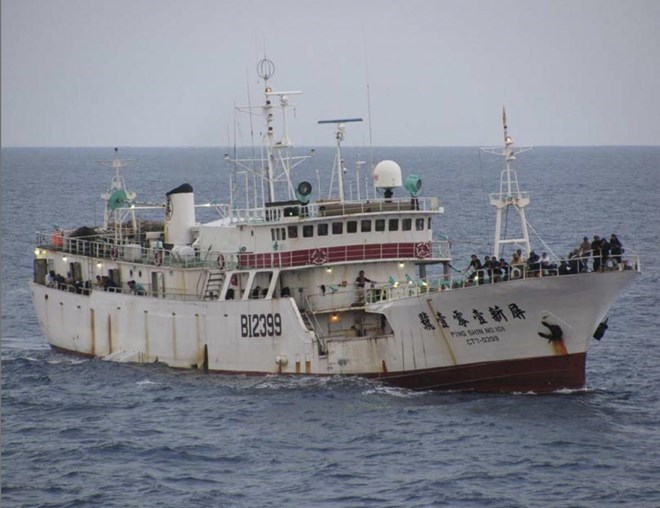
Friday June 17, 2022

Ping Shin 101, the Taiwanese ship carrying the gunmen involved in the murder. Picture: Fish-I Africa
Taipei, June 16 (CNA) The Kaohsiung branch of the Taiwan High Court on Thursday reduced the jail sentence handed down by a lower court to a Chinese captain who worked on a Taiwanese fishing vessel, from 26 years to 13.
Wang Fengyu (汪峰裕) was arrested on Aug. 22, 2020, after the ship he was in charge of, the Seychelles-flagged Indian Star, docked at Kaohsiung port, for allegedly ordering the killing of four pirates at sea in 2012.
He was indicted in October 2020 by Kaohsiung prosecutors on charges of homicide and violations of the Controlling Guns, Ammunition and Knives Act.
advertisements
In January 2021, he was found guilty of the charges and sentenced to 26 years imprisonment by the Kaohsiung District Court.Wang appealed the case to the high court, but the ruling was upheld in May last year. He then filed another appeal with the Supreme Court, which found discrepancies in the evidence provided and in August last year ordered the high court branch in Kaohsiung to re-examine the case for a retrial.
On Thursday, the high court said the evidence only showed Wang had ordered the killing of one pirate, not four, hence the reduced sentence to 13 years. The court said it also took into consideration the serious security issues related to being at sea.
The case can still be appealed.
The incident took place on board the Kaohsiung-registered longliner Ping Shin No. 101 (屏新101號) when it was operating in the Indian Ocean off the Somali coast on Sept. 29, 2012.
Wang, a Zhejiang-native, was hired by a Kaohsiung company to serve as acting captain of the Ping Shin in 2011.
According to the court, the Ping Shin was operating in the Indian Ocean about 595 kilometers southeast of the Somali capital of Mogadishu when it, along with the Kaohsiung-registered Chun I No. 217 (春億217號) and two other unidentified fishing boats, were fired on by a vessel manned by four pirates.
After the ships were fired on, one of them decided to ram the pirate vessel, which then capsized depositing the pirates into the ocean.
Despite knowing the four men were completely at his mercy, Wang allegedly instructed the two Pakistani mercenaries he hired onboard his ship to shoot the four men in the water.
The killings only became known to the public two years later when a 10-minute video clip of the fatal shootings was circulated on the internet in August 2014, when a phone used to film the murders was found in a taxi in Fiji. After the phone was found, an anonymous person posted the video to YouTube.
In the video, a man believed to be the captain is heard giving directions in Mandarin with a mainland Chinese accent over a loudspeaker to the crew as 40 rounds of live ammunition are fired.
The four unarmed men in the water are shot to death one by one, with the video showing the water turning red around them. No images of the shooters are seen.
Prosecutors said they spent a lot of time tracking down the vessel, but the captain never reported for questioning, so a warrant for his arrest was issued on Dec. 28, 2018.
Although Wang is a Chinese national and the crime occurred in the Indian Ocean, Taiwanese prosecutors said they were able to prosecute him because the shootings originated on a Taiwanese vessel.
In the indictment, Wang admitted to prosecutors that he was involved in "tracking down pirates" but said the shootings were in "self-defense."
Prosecutors also questioned a Vietnamese national who was a member of the crew on the Ping Shin No. 101 during the fatal shooting, and he confirmed that the man heard giving directions in Mandarin in the video was Wang.
According to Thursday's court release, Wang was employed by the Kaohsiung-based Ping Shin Fishery Co. to work on the Ping Shin No. 101 from June 15, 2011 to June 15, 2014.
There was no mention of the mercenaries or their whereabouts.
(By Hung Hsueh-kuang, William Yen, Joseph Yeh and Ko Lin)